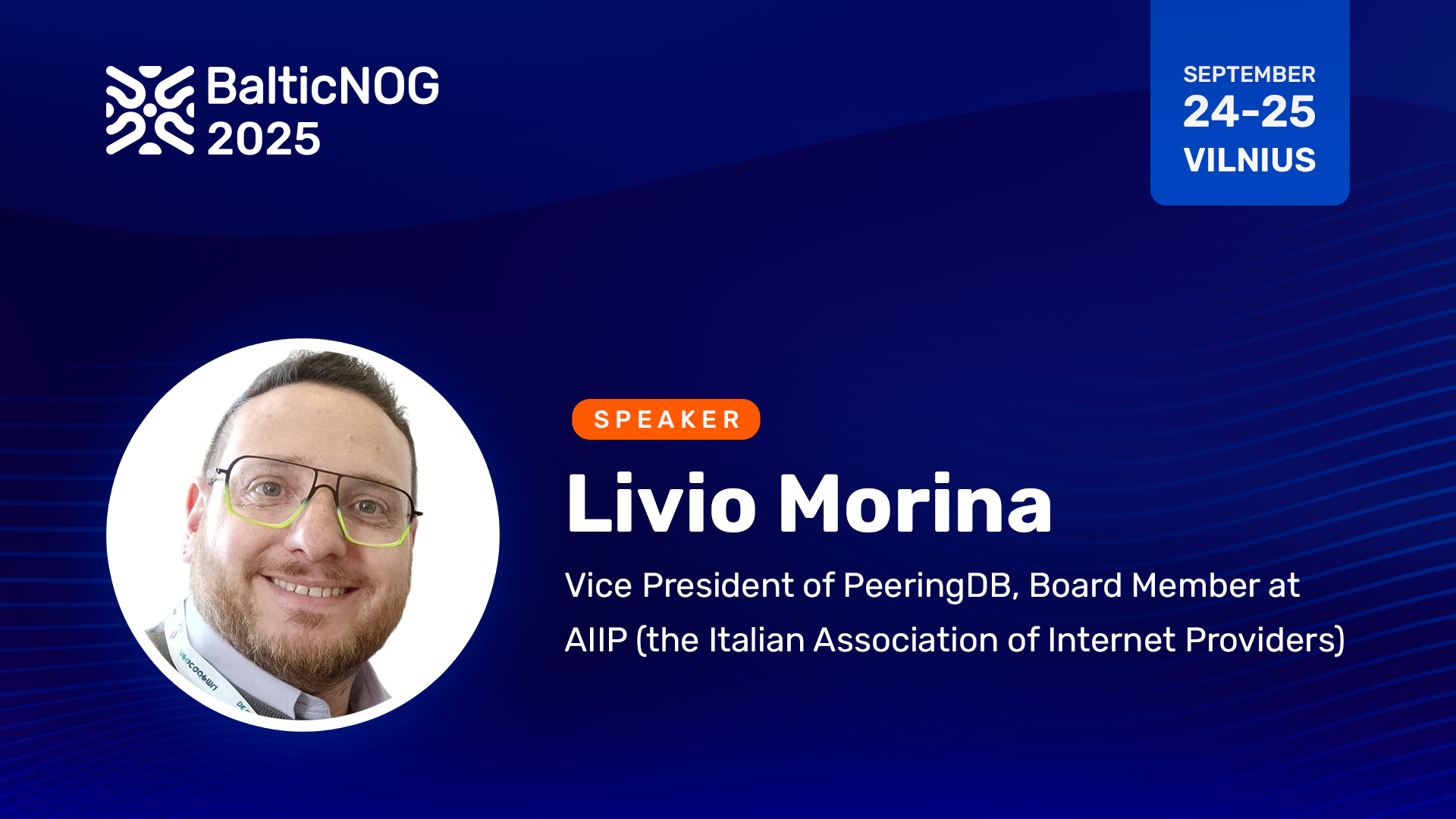Livio Morina: Behind Italy’s Automated Blocking System and the Fight to Keep the Internet Open
As Vice President of PeeringDB, CEO of Airbeam, and long-time advocate for independent ISPs across Italy and Europe, Livio Morina wears many hats. At BalticNOG, he brings a uniquely comprehensive perspective to one of the most controversial digital infrastructure topics in Europe today: the use of automated censorship systems to combat piracy and the unintended consequences they unleash.
Livio’s talk, “Automation to Fight Piracy: The Italian Experience,” is anything but theoretical. It draws directly from his role as an operator at Airbeam and a board member of AIIP, Italy’s national ISP association. This is not an outsider’s commentary—it’s a first-hand account of how a well-intentioned anti-piracy campaign has turned into a regulatory burden, a technical mess, and a civil liberties minefield.
The Emergence of Piracy Shield
2023 under pressure from Italy’s powerful Serie A football league and other rights holders, the Italian government passed Law 93/2023, mandating real-time content blocking to combat illegal streaming and copyright infringement. The law gave birth to a centralized, machine-to-machine (M2M) platform nicknamed Piracy Shield, through which rights holders could submit domains and IP addresses for immediate blacklisting.
The system operates on a pull-based model, where ISPs must download blocking instructions in near real-time, execute them, and confirm their action within tight timeframes—sometimes as short as two minutes. Operators like Airbeam are compelled to block IPv4/32s, IPv6/128s, and FQDNs, often without time to verify the accuracy or proportionality of the request.
The Practical Reality for ISPs
Livio walks the audience through the operational side of Piracy Shield—and it’s not pretty. The system is unreliable, prone to errors, and designed without regard for how real-world networks operate. Execution windows are too short. Retry logic causes loops and congestion. Delays stack up, logs grow messy, and operational clarity is lost. Randomized delays are a must, but even then, compliance becomes more art than science.
Worse still, the criteria for blocking content have shifted. Initially, an IP had to be exclusively used for piracy. But in 2025, that changed. If the IP is “predominantly” associated with piracy, it can be blocked. The term is intentionally vague, meaning collateral damage is inevitable. A blog about Lombard cuisine sharing the same IP as a flagged stream might be enough to prevent access to both.
Freedom vs. Enforcement
The system’s defenders argue it’s a war against organized crime, but Livio challenges that comparison. “We’re not dousing a fire,” he says. “We’re soaking everything around it, hoping the problem disappears.”
He shares staggering statistics: Tens of thousands of FQDNs and IPs have been banned through Piracy Shield. Yet, there’s no evidence that piracy has declined or that subscription revenues for broadcasters have increased. Whatead, the legal exposure and regulatory risk for ISPs—some of whom now face potential criminal liability if they don’t act fast enough, has grown, inst or fail to report “suspicious” behavior.
A Broader Battle for Internet Governance
Livio’s message goes beyond the technical and legal specifics of the Italian case. He frames it as a cautionary tale for Europe and the global network operator community. As he explains, once automated content blocking is normalized, it becomes challenging to draw the line between piracy enforcement and broader forms of censorship.
This isn’t just about sports streams. It’s about how laws written under pressure from powerful rights holders can reshape the very fabric of the internet—reducing transparency, eroding neutrality, and increasing surveillance in the name of compliance.
A Voice for Community Networks and Independent ISPs
Throughout his career, Livio has stood at the intersection of engineering, advocacy, and policy. From co-founding Airbeam to shaping national telecom legislation through AIIP and promoting cross-sector collaboration via Rivoluzione della Bellezza, he’s built a career blending deep technical understanding with civic responsibility.
His talk is essential for anyone concerned about the future of open infrastructure, especially as automation and regulatory frameworks intertwine in ways we’re only beginning to understand.
Don’t miss Livio Morina at BalticNOG 2025—where industry meets policy, and the defense of the internet takes center stage.

